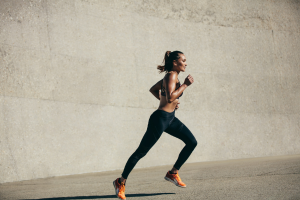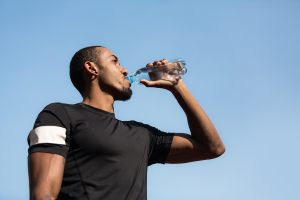There is a lot of information out there regarding post-workout nutrition, specifically, the anabolic window: should you eat immediately after a workout or wait a few hours? And why do you sometimes feel hungry after your workouts, but other times not at all?
Throughout this article, we will dive into the top three factors that impact hunger after a workout and how to address them as well as discuss the anabolic window and what research says about it.
But first, a note about hunger and hormones
Many people assume that since you burned calories during a workout, you should feel hungry when you are done, but that might not always be the case. A hormone called ghrelin is actually responsible for appetite stimulation, and it is released when blood sugars are low or when your stomach is empty, signaling to your brain that it’s time to eat. For this reason, burning calories does not directly impact your hunger,1 however, there are many aspects that do.

Factor 1: pre-workout meal

Do you find yourself always starving post-workout? If you answered yes, then looking at your pre-workout nutrition might be beneficial. For example, having a quick snack that provides a source of protein and carbohydrates before your workout can help prevent post-exercise cravings and will enhance performance by giving you fuel for your workout. So if you enjoy having a full meal one to four hours before working out, stick with it. However, try to avoid going more than four hours without food prior to a workout or you may unnecessarily cause your blood sugar levels to drop, leaving you feeling lightheaded or nauseous.1,2
Factor 2: type of exercise

The type of exercise you do also has an impact on your hunger levels. Research has shown that moderate to high-intensity aerobic exercises such as running, cycling, and swimming suppress ghrelin, therefore reducing appetite post-workout.3 However, the opposite is seen with resistance training – you may experience an increase in appetite due to muscle breakdown which causes the body to signal for more fuel in order to recover. But keep in mind, everyone’s response to exercise can vary. Therefore, it is important to know your own body cues and note how you’re feeling after working out in order to fuel accordingly.
Factor 3: hydration

The hypothalamus is the part of the brain responsible for interpreting both thirst and hunger, and since thirst cues tend to sometimes be subtle, many tend to mistake thirst for hunger. This can be counterproductive when it comes to fueling for fitness as it may lead to drinking less water and eating more calories.5 Not to mention, being dehydrated can make you feel lightheaded, weak, nauseous, and can even lead to muscle cramps.6 For this reason, it is crucial to drink enough water before, during, and after a workout. The American Council on Exercise recommends the following:7
- Drink 17 to 20 ounces of water 2 to 3 hours before you start exercising.
- Drink 8 ounces of water 20 to 30 minutes before you start exercising or during your warm-up.
- Drink 7 to 10 ounces of water every 10 to 20 minutes during exercise.
- Drink 8 ounces of water no more than 30 minutes after you exercise.
Not feeling hungry right after working out but feeling like you’re starving an hour later?
This might happen more often than you think and there is a reason. When you’re working out, your body focuses on providing blood flow to the working muscles such as the heart, legs, and arms. This means that other organs that are not being actively used, such as the stomach, receive less blood flow causing digestion to slow down. Once you’re done working out, your body could take up to 45 minutes to redirect the blood flow and release those appetite-stimulating hormones, delaying the sense of hunger.8
Should you eat even though you’re not hungry?
Short answer – yes. It is important to eat after a workout as it will help with recovery, performance, and even injury prevention. It doesn’t have to be a full meal, but having a quick snack such as a protein shake with fruit can make a difference in how you will feel. But if you’re not feeling hungry at all after a workout, aim to have a meal at least two hours after your pre-workout meal as this will also help with blood sugar regulation. Research suggests that pre- and post-workout meals should not be separated by more than 3-4 hours, after a 45-90 minute training session.9
What is the anabolic window?
For decades there has been a widespread concept called the anabolic window, which is the time frame following your workout where the consumption of protein and carbohydrates is recommended to replenish the energy lost and help with muscle recovery. This concept has risen in popularity as it is thought to be the ideal state where the body absorbs nutrients.
While it is true that the consumption of carbohydrates and protein is essential and has beneficial effects on training, the 30-60 minute time frame in which your body absorbs these nutrients is not as narrow as we once thought. In fact, ongoing research has suggested that the body will still take advantage of the nutrients up to 6 hours post-workout. Additionally, a study conducted in 2017 proved that if a pre-workout meal or snack containing both protein and carbohydrates is consumed, then your post-workout meal doesn’t need to be consumed immediately after you finish your workout. 10,11
So, what does this mean?
To simplify, there’s absolutely no harm in consuming carbohydrates or protein right after training, so if this works for you, keep it up. However, the fact that you must consume these sources within the first 30 to 60 minutes post-workout to get all the benefits is not true, as there is not enough scientific evidence to prove it. Instead, focusing on total carbohydrate and protein intake rather than specific timing can be more helpful to ensure that you’re replenishing your energy and enhancing muscle growth and recovery.
If you have additional questions about your post-workout nutrition or want to learn more about the anabolic window, we can help! Click here to meet with a registered dietitian nutritionist today.

References:
- https://www.self.com/story/theres-a-surprising-reason-youre-hungry-after-a-workout
- https://www.healthline.com/health/fitness-exercise/working-out-on-an-empty-stomach#risks
- https://scholars.wlu.ca/etd/1851/
- https://mlj.goums.ac.ir//article-1-1025-en.html
- https://www.corporatewellnessmagazine.com/article/hunger-vs-thirst
- https://familydoctor.org/athletes-the-importance-of-good-hydration/
- https://www.acefitness.org/resources/everyone/blog/6675/healthy-hydration/
- https://www.runnersworld.com/nutrition-weight-loss/a30980352/eating-after-workout-run-refuel-not-hungry/
- https://www.ncbi.nlm.nih.gov/pmc/articles/PMC3577439/
- https://lewis.gsu.edu/2021/10/13/fact-or-fiction-the-anabolic-window/#:~:text=While%20the%20common%20belief%20is,the%20individual%20is%20training%20in.
- https://www.ncbi.nlm.nih.gov/pmc/articles/PMC5214805/
Post written by FFC Dietetic Intern Patricia Rodríguez.